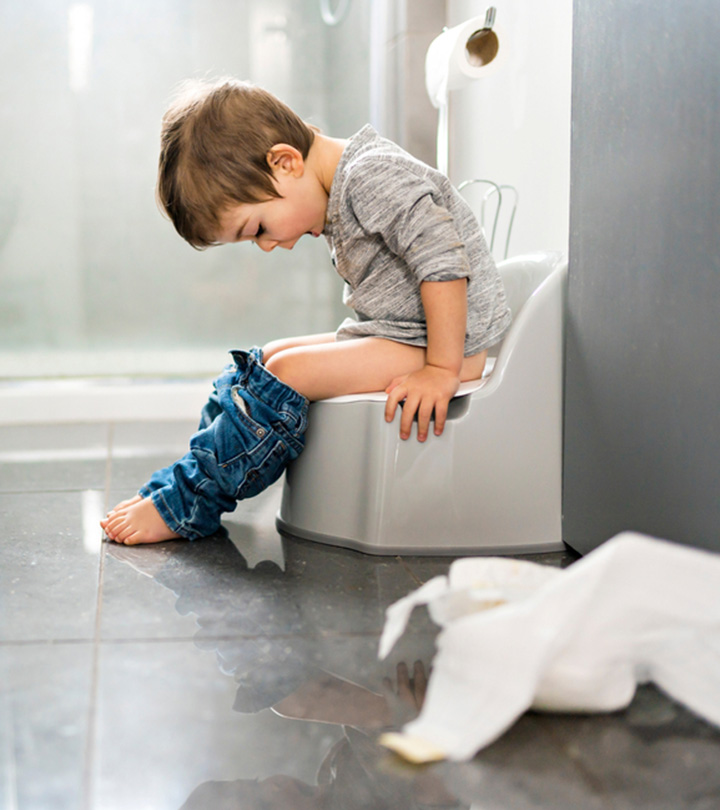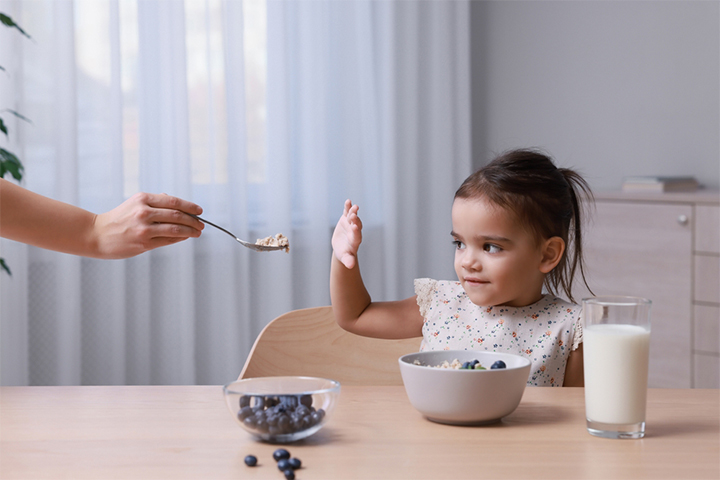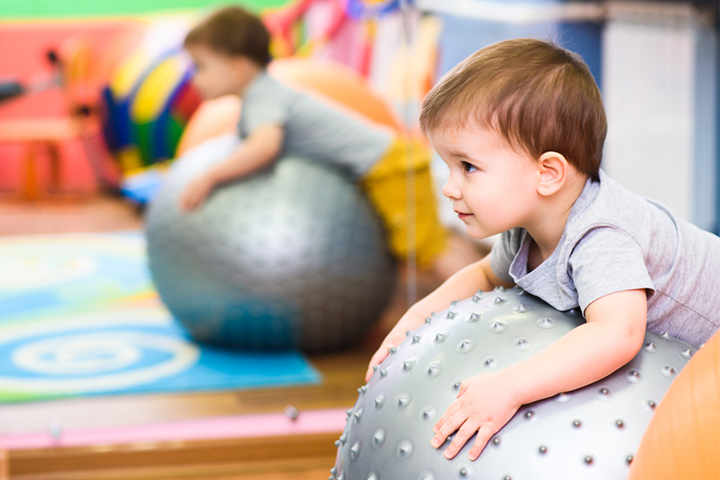Toddlers holding poop and not passing stool on time is a common phenomenon. This behavioral pattern may occur due to physical or psychological factors. If this problem is not resolved on time, it may lead to other health problems. Parents can deal with this situation only if they understand the cause behind their toddler’s behavior.
This post tells you about the signs and possible causes of a toddler holding poop. Also, learn effective ways to encourage your children to develop the habit of passing stool regularly.
Signs Of A Toddler Withholding Poop
The most notable sign is your toddler not passing stool for a few days. They may also show the following signs often suggestive of controlling the urge to pass stool (1) (2).
- Display more gassiness than usual
- Reduced appetite
- Make their body stiff
- Straighten their legs
- Cross their legs
- Clench the buttocks
- Stand on their toes
- Appear like they are straining as their face may turn red
- Some toddlers may display urine incontinence (urine leakage)
Why Do Toddlers Withhold Poop?
The following are the common reasons for toddlers to withhold stool.
1. Constipation
Constipation is usually the most common reason for toddlers to withhold poop (1). A comprehensive review and meta-analysis carried out by multiple institutions revealed that the prevalence of functional constipation ranges from 0.5% to a maximum of 32.2%. Toddlers with constipation have hard, dry, and difficult-to-pass stools, which are difficult to pass. It may cause the toddler to prefer withholding the poop, worsening constipation.
Rachelle, a mother and vlogger, says,”My little five-year-old boy had a very painful bowel movement, and so he got to a point where he didn’t want to go to the bathroom. I noticed that he used to go regularly every day, but he got to a point where he just started not going, and I noticed that three, four, or five days would go by, and he wasn’t going. And one day, he was in the bathroom crying because he did not want to poop; I went in and told him that he didn’t have a spirit of fear and that he could do it. Although it might sound silly for some, it worked for us, and the next day, he started going every day again, and we have not had to deal with it since (i).”
2. Fear of bad experiences
A toddler might have some fear of using the toilet due to previous bad experiences. An intimidating experience, such as being ridiculed for an accident by a classmate or sibling, might prevent them from pooping, especially at the place where the accident occurred.
At times, factors such as the location of the bathroom, sanitation levels, or embarrassment due to the loud sound of the toilet flush may make the child withhold their poop (4).
3. Uncertain about their potty training
Many toddlers have a smooth transition from diapers to the potty seat for peeing but may have problems with pooping out of diapers. They may resist pooping on the toilet seat, leading to the withholding of stool.
4. Independence and control issues
Toddlers develop a habit of asserting independence. They begin to refuse what their parents ask them to do and have a strong power struggle issue. Thus, when parents ask them to poop on the potty seat, they may refuse and withhold poop as they do not want to give in.
5. Engrossed in playing
Toddlers often do not like to spend their time in any other activity other than playing. They may rather spend time playing rather than visiting the toilet. It leads to withholding of poop, becoming a habit eventually.
6. Sensory or anxiety issues
Some toddlers with sensory processing disordersiXA disorder where the brain has problems processing sensory information of touch, smell, sound, taste, and sight. They might be overly sensitive to the smell and appearance of poop (5) or other hygiene or cleanliness-related aspects In such cases, the toddler may resist going to the toilet for days together despite visible discomfort due to a full bowel.
7. Lactose intolerance
Lactose intolerance or inability to digest lactose may cause both diarrhea (with abdominal pain and flatus) and constipation, the former being more common (6). Therefore, it may contribute to both unpleasant experiences as well as difficulty in passing stools for a child.
8. Health problems
Several health issues may cause a toddler to withhold poop deliberately or involuntarily. Most health problems cause other signs and symptoms likely to be more noticeable than withholding poop (7) (8) (9).
The following conditions may interfere with the ability to poop, causing the toddler to withhold poop voluntarily or involuntarily (10) (11) (12) (13).
- Celiac diseaseiXAn immunological response to consuming gluten leading to diarrhea.
- Hirschsprung diseaseiXA condition that damages the large intestine, making it difficult to pass stool.
- Irritable bowel syndrome
- Fecal impactioniXA condition when hard stool gets stuck in the large intestine.
- Colonic inertiaiXFailure of the colon to change the consistency of feces, thus preventing the smooth passing of stool from the intestine.
- Hypothyroidism
- Pelvic floor dysfunctioniXThe failure of the pelvic floor muscles to properly relax and contract to pass feces and urine.
Complications Of With Holding Poop
It is essential to resolve the problem of withholding poop since it may lead to the following complications (14)(15).
- Stomach pain
- FlatulenceiXPassing of gas through the anus, also called farting.
- Abdominal cramping
- Abdominal distensioniXA condition where the belly is significantly larger than it should be.
- Harder stools that are significantly difficult to pass
- Urinary incontinence
- Urinary tract infections
How To Get A Toddler To Poop?
Parents may try the following steps to help the toddler achieve healthy bowel movements (16).
1. Try simple strategies
You may try a strategy that works best for your toddler. A warm bath, a warm glass of milk, or a simple exercise before going to the toilet could work and make the toddler pass stool easily.
2. Choose the correct potty seat
Choose the right-sized potty seat for your toddler. Make sure their feet touch the floor, so they are not scared of falling off. The potty seat should be stable and not shaky so that the toddler isn’t frightened.
3. Educate the toddler
Positive reinforcement is essential and effective. Based on the toddler’s age and maturity, explain how the food we eat from the mouth is digested and eliminated from the body as waste or feces. Get them some books that are available for children being potty trained. Answer their queries and do not use words or expressions that define poop as something gross. Tell them it is a natural process and reinforce it through your words and actions.
Diya, a mother to two children, shares her parenting experiences in her vlogs. In one of her videos, she elaborates on how she approached potty training for her three-year-old daughter, “I showed her many cartoon potty training videos and got her a book. For the past month, we have been talking about how big girls poop on the potty like mom. We consistently praised and encouraged her, reinforcing that big girls use the potty (ii).”
4. Change the diet
Consumption of highly processed food items void of fiber can cause constipation in toddlers. Fast foods, junk foods, and soft drinks fall into this category. Consuming junk foods can trigger dopamine, also known as the “happy hormone.” The hormone makes us feel good, leading to an increased craving for such foods (17) (18). Fiber-rich foods, such as whole grains, leafy greens, and fruits, add bulk to the stools, making it easier to pass them. Make sure to also include probiotic foods, such as yogurt or kefir, to help balance the gut flora. If your toddler has a health condition that restricts the type of food they can eat, speak to a pediatric nutritionist who may suggest an appropriate diet plan.
5. Ensure adequate hydration
A fiber-rich diet with insufficient hydration may make a child’s constipation worse. Make sure the toddler drinks ample fluids. In addition to water, they may consume homemade soups, broths, and smoothies made from fresh fruits and vegetables.
6. Improve activity levels
Toddlers with a sedentary lifestyle may be more susceptible to constipation and poor bowel movements. Encourage your toddler to indulge in physical activities and games. Aerobic and muscle-strengthening activities are great at improving the health and motility of the digestive tract.
7. Schedule poop breaks
If your toddler resists pooping, schedule potty time at the same time everyday, at least twice a day, preferably about 15 to 30 minutes after meals. Your body has a natural reflex to empty the bowel after eating. Slowly work up to having your toddler sit for at least 10-15 minutes at a time. It will help establish a poop routine, causing the toddler to feel the urge to go to the toilet at the same time each day. It could make the toddler stop withholding poop eventually.
When To See A Doctor?
If dietary changes, lifestyle modifications, and positive reinforcement do not help, you may contact the child’s pediatrician. The doctor may look for the underlying cause, such as a health problem or psychological issue, and suggest relevant treatment or management strategies.
Toddlers holding poop is not uncommon; they show this behavior when constipated or when they have other health-related concerns. Some toddlers may also hold poop because they fear accidents and incorrect potty training. The typical signs of a toddler holding poop include appetite loss, gassiness, body stiffness, and discomfort. If you notice these signs and feel your toddler is holding their poop, it is best to consult a pediatrician who might comprehend the underlying cause and suggest some lifestyle measures for the toddler’s healthy bowel habits.
Key Pointers
- Standing on toes, reduced appetite, clenching buttocks, and crossing legs are common signs of a toddler holding poop.
- Fear of accidents, constipation, uncertain potty training, anxiety, engagement in play, or health issues can cause a toddler to hold the poop.
- Appropriate potty training and treating the causes can help avoid complications of withholding the poop, such as abdominal pain, gasses, and UTIs in toddlers.
Is your toddler scared to poop? Don’t worry, we can help! Watch this video to learn how to help your toddler overcome their fear of pooping.














